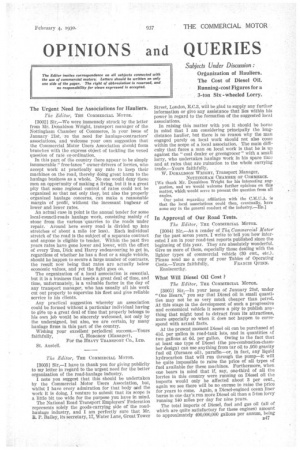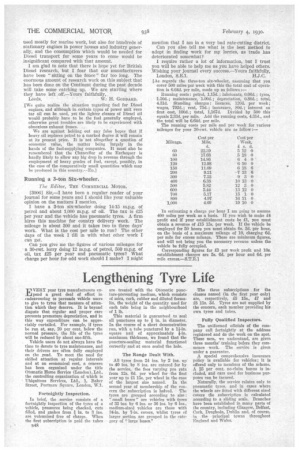OPINIONS and QUERIES
Page 73

Page 74

If you've noticed an error in this article please click here to report it so we can fix it.
Subjects Under Discussion: Organization of Hauliers. The Cost of Diesel OIL Running-cost Figures for a 3-ton Six -wheeled Lorry.
The Urgent Need for Associations for Hauliers.
The Editor, THE COMMERCIAL MOTOR.
[3002] Sir,—We were immensely struck by the letter from Mr. Donaldson Wright, transport manager of the Nottingham Chamber of Commerce, in your issue of January 21st, re the need for haulage-contractors' associations, and welcome your own suggestion that the Commercial Motor Users Association should form branches with the express object of tackling the vexed question of rate co-ordination.
In this part of the country there appear to be simply innumerable " free-lance " owner-drivers of lorries, who accept work at practically any rate to keep their machines on the road, thereby doing great harm to the haulage business as a whole. No one would deny these men an opportunity of making a living, but it is a great pity that some regional control of rates could not be organized so that not only they, but also the properly organized haulage concerns, can make a reasonable margin of profit, without the incessant bugbear of lower and lower rates.
An actual case in point is the annual tender for some local-council-roads haulage work, consisting mainly of stone from the various quarries to the roads under repair. Around here every road is divided up into stretches of about a mile (or less). Each individual stretch of the road is the subject of a separate contract and anyone is eligible to tender. Within the past five years rates have gone lower and lower, with the effort of every Tom, Dick and Harry endeavouring to get in, regardless of whether he has a fleet or a single vehicle, should he happen to secure a large number of contracts, the result now being that rates are actually below economic values, and yet the fight goes on.
The organization of a local association is essential, but it is a business that needs a great deal of time, and time, unfortunately, is a valuable factor in the day of any transport manager, who has usually all his work cut out properly to supervize his fleet and give reliable service to his clients.
Any practical suggestion whereby an association could be formed without a particular individual having to give up a great deal of time that properly belongs to his own job would be sincerely welcomed, not only by the undersigned, but also, we are certain, by many haulage firms in this part of the country.
Wishing your excellent periodical suceess.—Yours
faithfully, C. Hone-sox (Manager),
For the HEAVY TRANSPORT CO., LTD.
St. Austell.
The Editor, THE COMMERCIAL MOTOR.
[30031 Sir,—I have to thank you for giving publicity to my letter in regard to the urgent need for the better organization of the road-haulage industry.
I note you suggest that this should be undertaken by the Commercial Motor Users Association, but, whilst I have every admiration for that body mid the work it is doing, I venture to submit that its scope is a little bit too wide for the purpose you have in mind.
The National Road Transport Employers' Federation
• represents solely the goods-carrying side of the roadhaulage industry, and I am perfectly sure that Mr. R. P. Bailey, its secretary, 17, Water Lane, Great Tower Street, London, E.C.3, will be glad to supply, any further information or give any assistance that lies within his power in regard to the formation of the suggested local
associations. • .
In raising this matter with you it should be borne in mind that I am considering principally the longdistance haulier, but there is no reason why the man engaged purely on local work should not also come within the scope of a local association. The main difficulty that faces, a man on local work is that he is up against the "coal dealer or greengrocer " with a small lorry, who undertakes haulage work in his spare time and at rates that are ruination to the whole carrying trade.—Yours faithfully, .
W. DONALDSON WRIGHT, Transport Manager, NOTTINGHAMCHAMBER OF COMMERCE.
[We thank Mr. Donaldson Wright for his interesting suggestion, and we Would welcome further opinions on this ' matter, which would serve to present the question from all angles.
Our point regarding affiliation with the C.M.U.A. is that the local associations could then, eventually, have some say in the general conduct of the industry.—En.] In Approval of Our Road Tests.
The Editor, THE COMMERCIAL MOTOR.
[3004] Sir,—As a reader of The Commercial Motor for the past seven years, I write to-tell you how interested I am in your road-test reports published since the beginning of this year. They are absolutely wonderful. Give us more of them, especially those dealing with the lighter types of commercial vehicle (30 cwt., etc.). Please send me a copy of your Tables of Operating Costs.—Yours faithfully, FRANCIS QUINN. Enniscorthy.
What Will Diesel Oil Cost ?
Tire Editor, THE COMMERCIAL MOTOR.
[30051 Sir,—In your issue of January 21st, under "One Hears," you say that Diesel oil in small quantities may not be so very much cheaper than petrol. At this stage in the development of such a progressive and economical vehicle it seems a pity to publish anything that might tend to detract from its attractions, more especially so when it does not happen to correspond with actual facts.
At the present moment Diesel oil can be purchased at 43.d, per gallon in road-tank lots, and in quantities if two gallons at 6d. per gallon. Owing to the fact that at least one type of Diesel (the pre-combustion-chamber design) can use anything from tar oil to .950 gravity fuel oil (furnace oil), paraffin—or, in fact, any liquid hydrocarbon that will run through the pump—it will be quite impossible to raise the price of all types of fuel available for these machines. Furthermore, when one bears in mind that if, say, one-third of all the lorries in this country were running on Diesel oil the imports would only be affected about 3 per cent., again we see there will be no excuse to raise the price for years to come. Again, a Diesel-engined ocean liner burns in one day's. run more Diesel oil than a 5-ton lorry running 140 miles per day for nine years. The total Imports of Diesel, fuel and gas oil (all of which are quite satisfactory for these engines) amount to approximately 400,000,000 gallons per annum, being 1347 used mostly for marine work, but also for hundreds of stationary engines in power houses and industry generally, and the consumption which would be needed for Diesel transport for some years to come would be insignificant compared with that amount.
I am glad to note that there is hope yet for British Diesel research, but I fear that our manufacturers have been "sitting on the fence" far too long. The enormous amount of research work on this subject that has been done on the Continent during the past decade will take some catching up. We are starting Where they have left .off.-Yours faithfully, Leeds. W: H. GODDARD.
[We quite realize the situation regarding fuel for Diesel engines, and although in certain types of power unit even tar oil can be used, yet the lighter classes of Diesel oil would probably have to be the fuel generally employed, otherwise great troubles are likely to be experienced with obnoxious exhaust fumes.
We are against holding out any false hopes that if heavy, oil replaces petrol to a marked degree it will remain at its present price. It is not altogether a question of economic value, the matter being largely in the hands of the fuel-supplying companies. It must also be remembered that the Chancellor of the Exchequer is hardly likely to allow any big drop in revenue through the employment of heavy grades of fuel, except, possibly, in the case of the comparatively small quantities which may be produced in this country.-Eo.]
Running a 3-ton Six-wheeler.
The Editor, THE COMMERCIAL MOTOR.
(30061 Sir,-I have been a regular reader of your journal for some years and I should like your valuable opinion on the matters mention.
I have a 3-ton six-wheeler doing 14-15 m.p.g. of petrol and about 1,000 m.p.g. of oil. The tax is £25 per year and the vehicle has pneumatic tyres. A firm hires this machine for country delivery work. The mileage is about 300 and it takes two to three days' work. What is the cost per mile to. run? The other days of the week I fill in with what other work I can get.
Can you give me the figures of various mileages for a 30-ewt. lorry doing 12 m.p.g. of petrol, 500 m.p.g. of oil, tax £25 per year and pneumatic tyres? What charge per hour for odd work should I make? I might
mention that I am in a very bad rate-cutting district. Can you also tell me what is the best method to adopt in finding work for my lorries, as trade has deteriorated somewhat?
I require rather a lot of information, but I trust you will be able to help me as you have helped others. Wishing your journal every success.-Yours faithfully,
London, S.E.I. H.J.C. [As regards the three-ton six-wheeler, assuming that you cover 500 miles per week with this the total cost of operation is 6.64d. per mile, made up as follows:
Running costs: petrol, 1.15d.; lubricants, 0.06d.; tyres, 1.30d.; maintenance, 1.00d.; depreciation, 0.504.; tota], 4.31d. Standing charges: licences, 120d, per week ; wages, 7924.• rent, 75d.; insurance, 804.; interest on
first cost, 104.; total, 1,167d. Divided by 500 this equals 2.334. per mile. Add the running costs, 4.31d., and the total will be 6.694. per mile.
The running costs per mile and per week for various mileages for your 30-cwt. vehicle are as follow:
In estimating a charge per hour I am going to assume 900 miles per week as a basis. If you wish to make £4 profit and if your establishment costs be £1, you must obtain a revenue of £15 13s, per week. If the vehicle be employed for 50 honrs you must obtain 6s. 3d. per hour, on the basis of a maximum mileage of 10, charging 6d. per mile for excess mileage. These are minimum figures, and will not bring you the necessary revenue unless the vehicle be fully occupied.
Corresponding figures for £3 per week profit and 10s. establishment charges are 5s. 6d. per hour and 6d. per mile excess.-S.T.R.]




















































































































